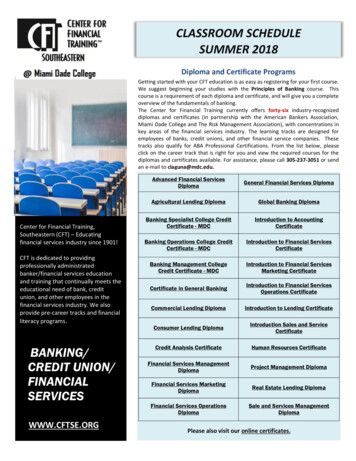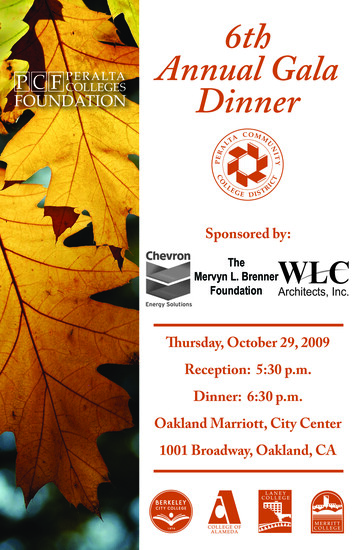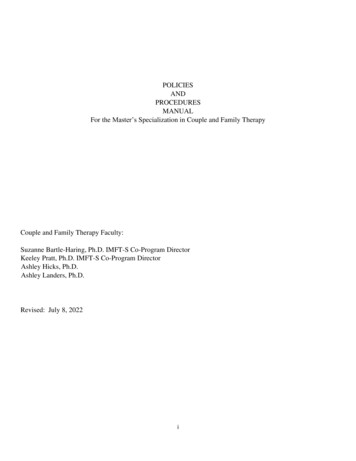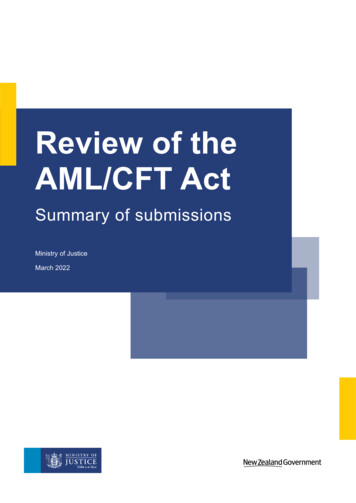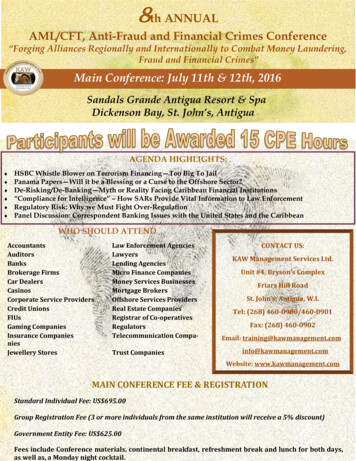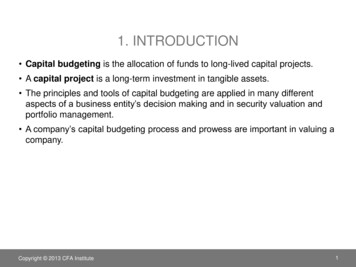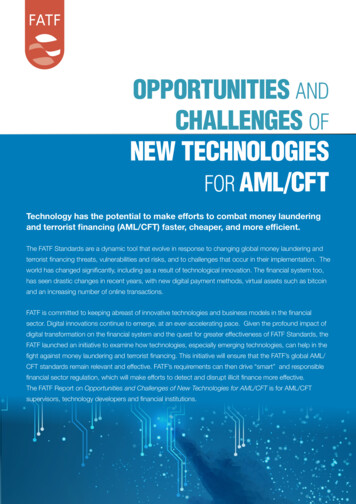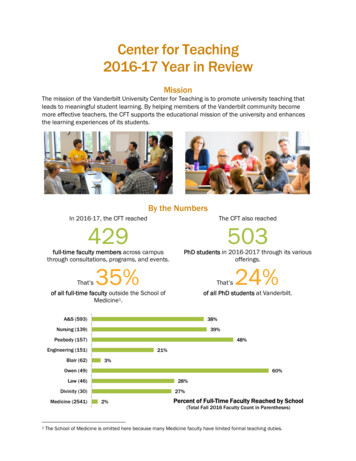
Transcription
Center for Teaching2016-17 Year in ReviewMissionThe mission of the Vanderbilt University Center for Teaching is to promote university teaching thatleads to meaningful student learning. By helping members of the Vanderbilt community becomemore effective teachers, the CFT supports the educational mission of the university and enhancesthe learning experiences of its students.By the NumbersIn 2016-17, the CFT reachedThe CFT also reached429503full-time faculty members across campusthrough consultations, programs, and events.PhD students in 2016-2017 through its variousofferings.That’s35%That’sof all full-time faculty outside the School ofMedicine1.of all PhD students at Vanderbilt.A&S (593)38%Nursing (139)39%Peabody (157)48%Engineering (151)Blair (62)21%3%Owen (49)60%Law (46)28%Divinity (30)Medicine (2541)24%27%2%Percent of Full-Time Faculty Reached by School(Total Fall 2016 Faculty Count in Parentheses)1The School of Medicine is omitted here because many Medicine faculty have limited formal teaching duties.
The CFT enhances the student learning experience by helping instructorsdevelop and refine foundational teaching skills and explore newteaching practices.Faculty and TA OrientationsThe CFT's annual orientations provide newfaculty and teaching assistants strategies andresources for launching effective teachingcareers at Vanderbilt. This year, 72 faculty and254 TAs participated in our orientations.Workshops & EventsThe CFT offers professional developmentworkshops on a variety of topics. This year, theCFT offered 19 events open to the campus andfacilitated an additional 58 invited sessions fordepartments, schools, and programs. Frequenttopics included educational technology, inclusiveteaching, and discussion leading.New this year was the CFT’s Just-in-TimeTeaching Conference, a set of workshops heldAugust 18-19 attended by 31 faculty, staff, andstudents.Course DesignInstituteThe CFT offered its secondannual Course DesignInstitute in May 2017. Inthis three-day workshop onthe theme “Students asProducers,” 14 facultymembers from 4 colleges and schools designed(or redesigned) courses that engage studentsnot only as consumers of information, butproducers of knowledge.“The discussions I had withcolleagues and CFT staff wereilluminating and energizing forboth my teaching and myresearch; I walked away feelingbetter able to design coursesthat mobilize my intellectualengagements and disciplinaryexpertise to evoke students’intellectual passions.”Elizabeth Meadows, Senior Lecturer, EnglishTeaching ConsultationsThe CFT provides a range of confidentialconsultation services for instructors interested inreflecting on their teaching experiences andengaging their students in deeper learning. Thisyear, CFT staff conducted a total of 579consultations with 352 unique individuals.Science Teaching LunchesSmall Changes, Big ResultsThis year the CFT launched a series of teachinglunches for faculty in Biological Sciences, Chemistry,Earth & Environmental Sciences, and Physics &Astronomy. Topics included interpreting studentevaluations to inform teaching, dealing with studentsin distress, and incorporating active learning. Morethan half of the faculty in these four departmentsattended at least one lunch.Negative course evaluations and a desire to retoolher teaching led one junior faculty member to meetwith a CFT consultant this year. After a classroomobservation and a small group analysis (the CFT’smid-semester student feedback service), it was clearthat the instructor was lecturing too much and notstriking the right balance of theory and practice.One participant noted, “It was very useful to set asidean hour to think about teaching and to get newperspectives on what I can do both in and out of theclassroom.” Another said, “It was a chance to take abreak from the ‘what do I need to do today’ routineand think about my teaching and ways to improvelearning in the classroom.”After discussing her course design and lessonplanning with the CFT consultant, the faculty membermade some relatively minor changes in her approachto content and discussion facilitation. Those changesled to big improvements in student engagementduring class and more positive evaluations at the endof the semester.
The CFT fosters innovative and effective use of educational technologiesby supporting instructors as they incorporate both new and establishedtechnologies in their teaching.Leading LinesIn collaboration withcampus partners, theCFT launched LeadingLines, a podcastexploring creative,intentional, andeffective uses oftechnology to enhancestudent learning. The podcast featuresinterviews with educators, researchers, andtechnologists at Vanderbilt and beyond.“I’m not only an interviewer forLeading Lines, I’m also anaudience member. Given therapidly changing environmentof educational technology,hearing others discuss changesand advances allows me torethink what we are doing atthe university.”John Sloop, Associate Provostfor Digital LearningTo date, 20 episodes have been produced, andthose episodes have been played or downloaded(collectively) more than 6,000 times. Seeleadinglinespod.com for the full episode list.Blended and Online Learning Design(BOLD) FellowsThe BOLD Fellows program supports facultygraduate student teams in developing andassessing online learning modules for STEMcourses at Vanderbilt. Since the programlaunched in 2013, there have been 30 BOLDFellows with projects implemented in 20courses, affecting more than 2,500 Vanderbiltstudents. BOLD Fellows have presented theirwork at 15 conferences, one Fellow haspublished his project, and three more havesubmitted manuscripts.In 2016-17, nine teams participated in theprogram, including 11 faculty members, 10graduate students, and one undergraduate fromA&S, Engineering, and Medicine.BrightspaceSupportThe CFT providesadministrativeleadership, technicaland pedagogysupport, andeducational outreachfor Brightspace,Vanderbilt’s new course management system.CFT staff worked with campus partners this yearto configure and implement Brightspace and totransition the campus from its prior system,Blackboard. Brightspace launched in the spring,with all summer 2017 courses running on thenew system.In support of the Brightspace launch, the CFToffered 21 orientation sessions for the newplatform, attended by 213 faculty, staff, andstudents. The CFT also launched a Brightspacesupport website, featuring 47 on-demandresources, tutorials, and walkthroughs forinstructors and students.Meanwhile, the CFT continued to supportBlackboard throughout the year. CFT staffresolved more than 3,400 help tickets forBlackboard and Brightspace support in 2016-17.“I have had several questionsabout Brightspace in the pastweek, and your staff havebeen wonderful in gettingback to me in a timely mannerwith helpful information. Eachstaff member has answeredquestions for me, and theyhave each been great. Thankyou for having such capablepeople!”Nancy Lea Hyer, Associate Dean, Owen GraduateSchool
The CFT supports the Vanderbilt community in developing a morediverse and inclusive environment for teaching and learning.Workshops & EventsCFT staff designed and facilitated severalworkshops and presentations on inclusiveteaching, some open to the campus, others atthe invitation of individual schools anddepartments. Specific topics included implicitbias, microagressions, students in distress,difficult dialogues, and teaching in tumultuoustimes.Creating Art in anInclusiveClassroomThere’s a new piece ofart hanging in the Centerfor Teaching: a quiltmade by NilaHuddleston, a Next Stepsstudent who took AlexSargent’s costumedesign course in the fallof 2016. Next Stepssupports students withintellectual disabilities totake classes atVanderbilt. A senior lecturer of theatre, Sargent tookthe CFT’s 2016 Course Design Institute on the themeof “Students as Producers.” Sargent worked with NextSteps to develop a design project for Nila. While thequilting portion of the project was a collaborativeeffort among the whole class, Nila did all the designwork and drew the animals woven into the quilt.Class MattersAs an extension of its ongoing explorations ofteaching, difference, and power, the CFT hosted alearning community on teaching and social class forfaculty, staff, and students that met monthly duringthe academic year. The group shared its work andengaged the broader campus in conversation duringthe CFT’s Class Matters symposium, held in April2017. The symposium featured a wide-rangingdiscussion about ways in which class differences andconflicts manifest in campus life, as well as strategiesfaculty and staff can employ to create a more classconscious and inclusive culture.Opening speaker SharonShields, Professor of the Practiceof Human and OrganizationalDevelopment, challenged theaudience: “Do you commit to anengaged pedagogy thatrecognizes the importance ofconstructively confronting issuesof class? That means welcomingthe opportunity to alter ourclassroom practices creatively so that the democraticideal of education for everyone can be realized.”Undergraduate student Hannah Lazarz, Nila’s NextSteps ambassador, took the costume design course,too. “Nila’s quilt is a perfect example of a creativeprocess through which I got to collaborate withsomeone I admire as an individual who is confidentand bold in her artistic choices.”TeachingConsultationsCFT staff consultedwith dozens of facultyand graduate studentinstructors on issues ofdiversity in theclassroom andinclusive teaching.
The CFT supports trans-institutional collaborations by hosting andfacilitating cross-campus conversations and programs that engagefaculty, staff, and students.Learning CommunitiesJunior Faculty Teaching FellowsThe CFT hosts a number of learning communitieseach year, intended to help participants developdeeper understandings and richer practicesaround particular teaching and learning topics.The faculty fellows in this yearlong programengage individually and as a cohort in a set ofactivities designed to improve their teachingskills and help them build courses that fostermeaningful student learning. The 9 fellows thisyear came from a variety of departments in Arts& Science and Peabody.Topics for 2016-17 included teaching and socialclass, teaching Maymester courses, labpedagogies, coordinating language courses, andteaching with podcasts. A total of 95 faculty,staff, and students from seven colleges andschools participated in this year’s learningcommunities.Teaching VisitsNew this year, the CFT organized “Open Dores,”two days of teaching visits in which 35 facultyfrom four colleges and schools opened theirclassrooms to colleagues to observe theirteaching and discuss shared teachingchallenges. A total of 90 faculty, staff, andstudents participated in the event as hosts orvisitors.“It’s always impressive to seehow different people leaddiscussion, what kind ofexamples they use, and whatkinds of questions they ask. It’suseful to get a sense of whatother people are doing so thatyou don’t feel like you’re onyour own.”Sara Mayeux, AssistantProfessor of LawTeaching Design ThinkingDesign as an Immersive Vanderbilt Experience (DIVE)was selected this year as Vanderbilt’s QualityEnhancement Plan. The new program will teachstudents across campus to apply human-centereddesign processes to tackle complex problems withcreative confidence. CFT staff consulted on thestructure of the program, and worked with faculty toadd design-thinking elements to new and existingcourses.Teaching in Tumultuous TimesEach year the CFT hosts a dinner for current andformer Junior Faculty Teaching Fellows. This year, theinvitation posed the following question for discussionat the dinner: How is the current political climateaffecting your interactions with your students? Thatquestion proved to be a compelling one, motivating35 past and present Fellows to join the CFT for dinnerand discussion.The conversation was a lively one. Fellows and CFTstaff identified learning goals with particularimportance in the current climate, includingdeveloping students’ skills in evaluating argumentsand their ability to understand others’ perspectives.The group also shared several teaching practicesthey use to help reach these goals, includingdepersonalizing or defamiliarizing issues, creatingclassroom civility guidelines, and engaging studentsin debates and simulations.
The CFT strengthens graduate education by providing professionaldevelopment for students planning careers that involve teaching.Certificate in CollegeTeachingThis program focuses on theresearch on how people learnas well as best teachingpractices, preparingparticipants for future teaching roles in theacademy. This year, 50 graduate students andpostdocs completed the program.Certificate inHumanities Teachingand LearningParticipants in this programexplore and develop skills inteaching diverse learners inthe humanities as part of aliberal arts curriculum. This year, 17 graduatestudents completed the program.Evidence-Based Undergraduate STEMTeaching CoursesWith funding from a multi-institution NSF grant,the CFT offers two free online courses designedto provide future STEM faculty with anintroduction to effective teaching strategies andthe research that supports them. Over 6,000participants from around the world were active inthe courses this year.The CFT’s scholarly work contributes to national and internationalconversations on teaching and learning.PublicationsInvited TalksPeer-reviewed publications by CFT staff this yearincluded articles CBE—Life Sciences Education,Dimension, the Journal of Microbiology & BiologyEducation, and the Michigan Journal ofCommunity Service Learning.In 2016-17, CFT staff gave invited talks at BrownUniversity, Franklin (TN) Special School District,Indiana University-Purdue University,Northwestern University, University of AlabamaHuntsville, University of Minnesota, University ofSharjah (UAE), and Yale University, amongothers.Online ResourcesThe CFT website, cft.vanderbilt.edu, featuresmore than 70 literature-based teaching guideson various topics authored by CFT staff, as wellas regular blog posts exploring perspectives onteaching and learning. The website received over3 million pageviews this year.New Teaching Guides for 2016-17: Understanding by Design Dealing with the Unexpected Active Learning Learning and Course Management Systems Leveraging Travel Abroad Digital Textbooks Teaching Adult Undergraduate StudentsConferencesThis year, CFT staff presented at conferencesheld by the American Association of Teachers ofSpanish and Portuguese (AATSP), the AmericanCouncil for the Teaching of Foreign Languages(ACTFL), Imagining America, the Professional andOrganizational Development (POD) Network, theSouthern Regional Faculty and InstructionalDevelopment Consortium (SRFIDC), andSupporting Learning and Technology inEducation (SLATE), among others.
StaffIn 2016-17, the CFT employed eleven full-time staff members as well as four Graduate TeachingFellows and one post-doctoral fellow. Five members of the CFT staff have secondary appointments inArts & Science or Peabody and teach courses in those colleges.Derek Bruff, PhDDirectorMathematicsJoe Bandy, PhDAssistant DirectorSociologyCynthia Brame, PhDAssistant DirectorBiological SciencesVivian FinchAssistant DirectorGermanStacey Johnson, EdDAssistant Director forEducational TechnologyRhett McDanielEducationalTechnologistLee ScarboroughInstructionalTechnologistAshley BurtonInstructionalTechnologistBrandon CrawfordInstructionalTechnologistTracy TveitProgram CoordinatorJuliet TraubAdministrative AssistantNoah GreenWIDER FellowBiological SciencesLydia BentleyGTFTeaching & LearningRyan BowenGTFTeaching & LearningMichael FisherGTFReligionAlexis McBrideGTFTeaching & Learning
of all full-time faculty outside the School of Medicine 1. The CFT also reached 503 PhD students in 2016-2017 through its various offerings. That's 24% of all PhD students at Vanderbilt. 1 The School of Medicine is omitted here because many Medicine faculty have limited formal teaching duties. 38% 39% 48% 21% 3% 60% 28% 27% 2% A&S (593 .
